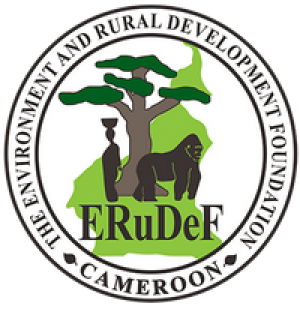[one_third] [/one_third]Some ten local rangers selected from Moungo and Kupe Muanenguba Divisions, adjacent to the proposed Mt Muanenguba Integral Ecological Reserve, have been schooled on biodiversity and resource management.
[/one_third]Some ten local rangers selected from Moungo and Kupe Muanenguba Divisions, adjacent to the proposed Mt Muanenguba Integral Ecological Reserve, have been schooled on biodiversity and resource management.
Facilitating NGOs, the Environment and Rural Development Foundation (ERuDeF) and the Cameroon Herpetological Biological Conservation Foundation (CAMHERP-CBF), trained the rangers in a workshop that took place recently in Nkongsamba, Moungo Division, Littoral Cameroon.
Stanley Khen
Speaking during the training, wildlife biologist, Stanley Acham explained the role of community rangers in monitoring, evaluation, surveillance and control in the project area. He outlined the general overview of the project, schooling the rangers on how they are committed on each phase.
Another biologist, Ngoe Fai, schooled the rangers on biodiversity, explaining the role of community rangers in biodiversity conservation. He also made the participants to understand their role in sustainable management of the project site.
The Chief of Wildlife and Protected Areas for Kupe Muanenguba Division, Mekole Gustav Sorele, briefed the participants on forestry laws, classes of species found in the project site stipulating offences and penalties.
On their part, the rangers who followed with great attention the various lectures, said trainings were impactful.
“This training has made me to understand mammals and amphibians. I have understood those species of class A, B and C. I now know that hunting certain species or in commercial quantities one needs a permit. I now know what the functions of a community ranger are. I want to thank ERuDeF and CAMHERP-CBF for giving me this opportunity and making me to understand what biodiversity is all about and the development it brings,” said Ndunge Simon from Muelong.
[one_half] [/one_half]The rangers indicated, they will welcome more trainings that will enlighten them on conservation around the proposed protected site.
[/one_half]The rangers indicated, they will welcome more trainings that will enlighten them on conservation around the proposed protected site.
“I am glad to be present here today because I have learnt a lot. I pray God should guide us. I have worked in this area for seven years with Dr. Nono on Frogs, Chameleons and lizards. It pleases me because I enjoy doing it. I am okay with the small compensation I have always gotten,” indicated AbdouKarimou, participant from Mbororo Camp.
Mount Muanenguba which cuts across the Southwest and Littoral Regions of Cameroon is said to have a heterogeneous Ecosystem, harbouring 100 species of amphibians, 89 species of reptiles and 270 bird species amongst which 60% of them are endemic. The mountain with height of 2411 meters above sea level, suffers chronic threats from communities living adjacent to the mountain. Habitat degradation, which involves conversion of natural land for agricultural land through shifting cultivation, destruction of trees for commercial purposes, overgrazing and trespassing of cattle in streams and water ponds, collection of amphibian and reptile species, amongst others, are the main threats rocking the mountain.
Faced with all of these challenges, Cameroon’s leading conservation NGO, the Environment and Rural Development Foundation (ERuDeF), joined forces with the Cameroon Herpetology-Conservation Biology Foundation (CAMHERP-CBF) to conserve the rich biodiversity and Ecosystem of Mount Muanenguba with focus on Amphibians and Reptiles.
